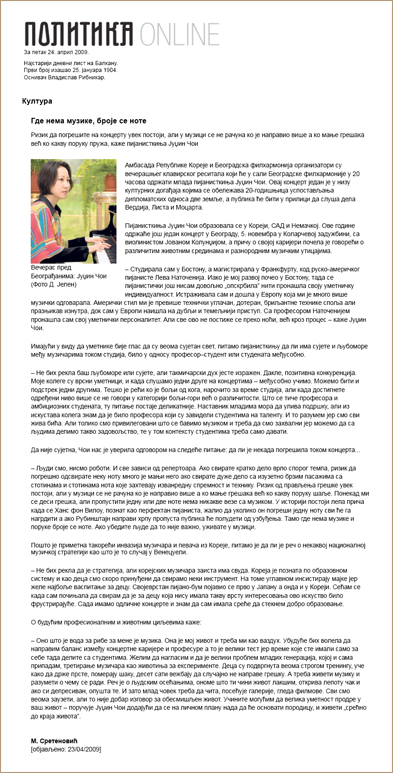Interview | Politika( Serbian newspaper) / interview ( 24.04.2009)
1 Politika- Serbian news paper interview Date : 2009-09-02 Where there’s no music, one counts the notes There is always a risk that one might make a mistake at a concert, however, when it is about Music, what counts is the message, and not who makes more or fewer mistakes. The embassy of the Republic of Korea and Belgrade Philharmonic Orchestra are organizers of a piano recital tonight that will be perofrmed by young pianist Eugene Choi at The Belgrade Philharmonic Orchestra hall at 20.00. This concert is one of a series of cultural events marking 20th anniversary of the establishment of diplomatic relations between the two countries and the audience will have opportunity to listen to the music of Wagner, Verdi, Mozart and Liszt. Pianist Eugene Choi obtained her education from Korea, USA and Germany. She will also perform other concerts in Belgrade this year with violinist Jovan Kolundzija on November 5th and December 10th at Kolarac concert hall. She told her life story citing her surroundings and musical influences. -I studied in Boston, receiving Bachelor’s and Master’s degree from New England Conservatory. Although my musical development started in Boston, or even before in Seoul, Korea it was with my Russian-American pianist Prof. Lev Natochenny under whose guidance I found my true artistic personality. He is a former student and assistant of the legendary Prof. Lev Oborin at the Moscow Conservatory. I am truly grateful to him. Knowing that some artists are vain, we ask the pianist if there is vanity and jealousy among musicians during studies, professor-student, or student-student relations. -I wouldn’t say it’s actually jealousy or vanity, but rather competitive spirit, a healthy competition. My colleagues are extraordinary artists and when we listen to each other’s concerts we learn. We are also a stimulus to each other. It is hard to say who is better if one is not exactly a student but an aspiring artist. At this point each of us has a distinct artistic personality and that’s what makes it interesting, the variety of personalities. For some professors and overly ambitious students the issue becomes more delicate. A teacher is suppose to give support to the young, but from my colleagues’ experience I know that there are professors who envy their students’ talent. Understandable, of course ? we are only human after all. However, artists are privileged having gotten the talent, should be grateful and share it with others. A teacher is always a giver rather than a taker. Ms Choi has assured us she is not vain by answering the following question: has she made a mistake at some concerts… -None of us are robots, and all depends on how one feels at any given moment on stage, also depends on repertoire. A short 2?3 minutes piece of music at a moderate tempo diminishes the chance of a mistake while a 30-minutes piece of transcendental difficulty increases that risk. But when performance is about Music, what counts is the message and not how many mistake there are. The story goes that Hans von Bulow, (a great pianist), complained that when he accidentally touches one wrong note in concert people talk about it for weeks, while Anton Rubinstein (even greater pianist) throws dozens of wrong notes during the concert and nobody notices! when the message in the music is lacking one counts wrong notes. If an artist has a convincing message wrong notes matter little. With respect to her future professional and life goals she says: -In Music I feel like fish in water. It is my life and I need it as air to breath. I would like to achieve a reasonable balance between my concert and academic careers. It is not easy because the time I have now for myself will have to be shared with students. However it is a great joy to be able to share and pass the knowledge onto the next generation, to continue the tradition. There is a strong tendency among young piano students to be trained somewhat similar to circus animals. Youngsters are subject to very strict and limited instrumental training, playing fast and loud for 8-10 hours daily. Outside of moving fingers, there is practically no attention to great literature, art and movies, in a word to living a life. As one experiences life the music changes as well. M. Sretenovic
